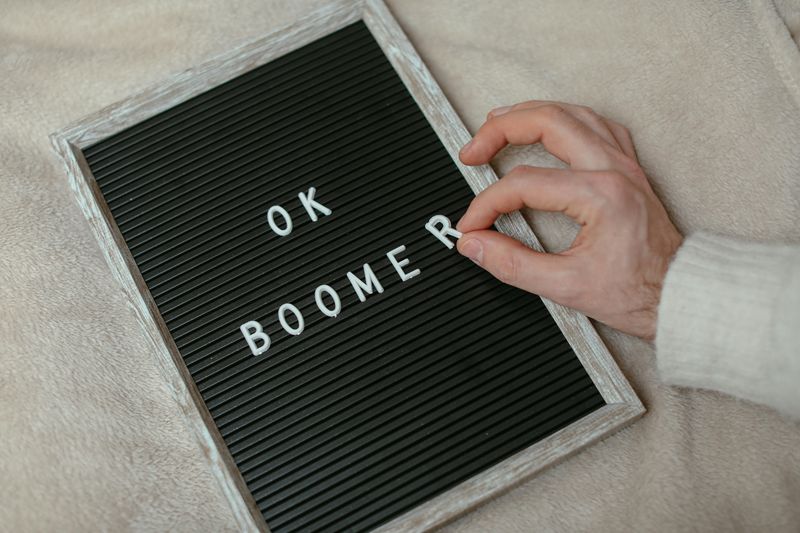Boomers, Please Stop Doing 32 Things That Drive Everyone Crazy
Hey there! If you’ve ever cringed at something your parents or grandparents said or did, you’re definitely not alone. Some habits that Boomers picked up over the years don’t always sit well with younger generations—and while they might be well-meaning, they can sometimes feel a little off.
This isn’t about calling anyone out just to poke fun. It’s about noticing the small things that create disconnects—and maybe laughing about them along the way.
So if you’re curious why certain quirks spark eye-rolls, or just wondering what all the fuss is about, you’re in the right place. Let’s take a closer look at a few habits that could use a refresh.
1. Talking Loudly on Speakerphone in Public

Ever been in a cafe enjoying your coffee when suddenly you’re forced into someone’s phone conversation? You’re not alone. Talking loudly on speakerphone in public spaces is a sure way to get heads turning, and not in a good way. It feels intrusive, like your personal bubble just got popped by someone else’s conversation.
Imagine trying to read a book or have a quiet chat, and there’s a loudspeaker blaring personal details you didn’t ask to know. It’s not just distracting but comes off as inconsiderate. Next time, a pair of headphones might just keep the peace.
2. Forwarding Chain Emails That No One Asked For

Remember those chain emails threatening bad luck if you don’t forward them? Well, they’re still making rounds, much to everyone’s chagrin. Forwarding long, outdated chain emails might seem like a charming habit, but it’s more like digital clutter.
Think of it as a playful PSA from your grandkid, urging you to hit delete instead of forward. In today’s quick-scroll world, no one has time to decode a 90s-style email. Let’s save the inbox space for memes and cat videos instead.
3. Using Ellipses… Like This… All the Time

Ellipses are like seasoning; a pinch adds flavor, but overdo it, and you’ve got a mess. Using ellipses… incessantly… can come across as confusing, dramatic, or even passive-aggressive.
It’s like ending every sentence with a cliffhanger, leaving everyone guessing your real intent. While it might feel like a pause or a continuation in thought, it often leaves people scratching their heads. So, maybe go easy on the dot-dot-dots and say exactly what you mean.
4. Complaining About “Kids These Days”

Ah, the classic “kids these days” complaint. It’s like a broken record that gets old fast. Generalizing entire generations with gripes is a surefire way to get eye-rolls from the younger crowd. Perhaps they believe Boomer dating habits were better than those nowadays, or the kids don’t work as much, or they’re too much on their phones.
Instead of starting a conversation, it often shuts it down. It’s like gently roasting a parent by reminding them that every generation had its quirks. Maybe swap the complaints for curiosity about what makes today’s kids tick?
5. Refusing to Learn Basic Tech Etiquette

Ever received an ALL-CAPS text from a Boomer? It’s like getting yelled at through the screen. Refusing to learn basic tech etiquette, like not replying to group chats with unrelated questions, can be super frustrating.
These small things make all the difference. It’s like a friendly nudge, encouraging a little tech savvy-ness. Think of it as a way to bridge the generational gap without the caps lock on.
6. Saying “Back in My Day” Every Chance You Get

“Back in my day” is like kryptonite for conversations. It has a magical ability to make everyone tune out. Mentioning chores they had to do unquestionably or behaviors they had to abide by can result in younger generations being resentful towards them or simply stop listening.
While nostalgia is sweet, constantly comparing now to then can feel like a wet blanket on discussions. It tends to dampen the vibe, making people feel like their experiences are less valuable. Maybe save the “back in my day” for storytelling sessions, where nostalgia can truly shine?
7. Leaving Voicemails for Things That Could Be Texts

Voicemails have become the radios of yesteryear—relics rarely visited by the younger generations. Leaving a voicemail for something that could just as easily be shot over in a text feels like a step back in time. Younger folks often find texting faster and less intrusive, offering the freedom to reply at their leisure. It’s like a gentle nudge to embrace the present and save the voicemails for birthdays and special occasions.
8. Dismissing Mental Health as a “Phase”

Brushing off mental health discussions with a casual “it’s just a phase” can feel dismissive and outdated. It’s like being in an honest chat with a stubborn relative who just doesn’t get it, so it’s not surprising that Boomers are battling with family estrangement so much.
Mental health is a vital topic, not a passing trend. Acknowledging it can be as easy as listening and offering support instead of skepticism. Let’s embrace understanding over dismissiveness.
9. Making Everything Political at Family Gatherings

There’s nothing like a good political debate to kill the vibe at a family gathering. Bringing up politics at every dinner or holiday event often feels like a wet blanket on the festive spirit.
It’s like turning a fun get-together into a Senate debate. Instead of diving into divisive topics, perhaps keep the focus on shared memories and good food? After all, isn’t that what family gatherings are really about?
10. Oversharing Personal Info on Facebook

Posting deeply personal stories on Facebook can be uncomfortable for everyone involved. It’s like airing out your diary for the world to see, complete with awkward giggles and secondhand embarrassment. That’s a habit Boomers need to stop doing!
While sharing is caring, there’s a line between connecting with friends and oversharing. Keeping some stories for face-to-face chats might just save everyone a scroll-induced cringe.
11. Judging Tattoos Like It’s 1983

Tattoos aren’t the taboo they once were, but some still judge them like it’s 1983. It’s like having a coffee chat with an eyebrow constantly raised.
Judging tattoos comes off as outdated and can feel dismissive of personal expression. Maybe next time, ask about the story behind the ink—it’s a conversation starter, not a judgment zone.
12. Misusing Emojis in the Most Unsettling Ways

Emojis can be a fun way to add flair to a message, but misuse them, and things get weird fast. Picture the crying-laughing face in a serious text or the eggplant emoji in unexpected contexts.
It’s like an emoji jungle out there, and navigating it can be tricky. A cheeky reminder: some emojis have meanings beyond their face value. A little emoji literacy can go a long way!
13. Talking Over Everyone in Conversations

Interrupting or dominating conversations is like pulling the emergency brake on a lively discussion. It leaves others feeling dismissed, like their voices don’t matter.
It’s not about preaching but nudging a friend to take a breath before diving in. After all, conversations are better when everyone gets a chance to chime in.
14. Shaming People for Not Owning a House Yet

Owning a home is a milestone, not a mandatory checkpoint. Comparing today’s economy to yesteryears while shaming others for not owning a house feels tone-deaf and is a toxic habit boomers need to stop doing.
It’s like pouring cold water on dreams built on different foundations. Instead, maybe acknowledge that paths now are as varied as the individuals on them. Empathy over judgment goes a long way.
15. Acting Like Working From Home Isn’t Real Work

Remote jobs and freelance gigs are as real as any office-bound career. Dismissing them as “not real work” shows a gap in understanding.
It’s like explaining to someone that the modern office has no walls. Informative chats can bridge this gap, highlighting the dedication and effort behind digital careers.
16. Saying “Real Music” Ended Decades Ago

Claiming that “real music” ended decades ago is akin to closing one’s ears to a symphony of new sounds. It’s like a car ride where only one station plays.
Encouraging exploration of today’s diverse genres could open doors to unexpected favorites.
17. Refusing to Use Headphones on Public Transit

Playing loud videos or music in shared spaces without headphones is like sharing a personal concert no one asked for. It’s an awkward performance with secondhand embarrassment included.
Keeping the peace is as simple as popping in some earbuds, turning shared spaces back into serene zones.
18. Assuming Everyone Has the Same Life Goals

Assuming everyone wants marriage, kids, or a 9–5 job is like using a mold for cookie dough dreams. Life goals are as varied as the people who hold them.
This concern probably comes from the best possible place and is a thing Boomers wish their kids understood. Yet, their assertiveness can blur the concern. Next time, maybe ask instead of assume? It’s a great way to understand and appreciate individual paths.
19. One-Upping Every Story with a Bigger One

Always having a bigger story is like adding extra salt to a dish—it quickly overwhelms. Constantly topping someone else’s tale derails conversations, turning them into competitions rather than exchanges. A touch of lighthearted banter can remind that shared stories, not size, enrich interactions.
20. Acting Confused by Pronouns (But Not Really Trying)

Pretending pronouns are “too hard” feels dismissive, like a puzzle no one wants to solve. It’s akin to brushing off someone’s name as too difficult—it’s about effort, not ease.
This is a Boomer habit that doesn’t fly with Gen Z. Explaining with love and patience can foster understanding, turning confusion into connection.
21. Calling Instead of Texting—Constantly

Unannounced phone calls in today’s culture feel like pop quizzes—unexpected and often unwelcome. Calling instead of texting disrupts the flow of the day, making people screen calls like pros.
It’s like a gentle reminder that a text is just a tap away, offering convenience for all involved.
22. Offering Unsolicited Advice as “Just Trying to Help”

Unsolicited advice often feels more judgmental than helpful. It’s like receiving a life manual no one asked for, especially on personal topics.
A casual, non-blaming tone can help shift from unsolicited tips to open, supportive discussions.
23. Making Passive-Aggressive Comments About Lifestyle Choices

Comments like “Must be nice not having kids” are like backhanded compliments wrapped in dry humor. They don’t contribute to conversation but rather halt it with awkwardness.
Keeping it real with a touch of humor can diffuse tension, turning awkward moments into teachable ones.
24. Sharing Inaccurate “Facts” Without Checking Anything

Posting or repeating false info without checking causes confusion, like fog on a clear day. A helpful heads-up ensures clarity and accuracy, avoiding unnecessary stress.
It’s a gentle reminder that a quick fact-check is like a lighthouse guiding through the fog.
25. Bragging About Not Needing Therapy

Saying “I never needed therapy” comes off as dismissive and out of touch. It’s like ignoring the benefits of an umbrella in a rainstorm.
A soft, honest tone can help shift the narrative, embracing therapy as a tool, not a taboo.
26. Expecting Praise for Doing the Bare Minimum Around the House

Celebrating basic tasks like doing the dishes can come off as patronizing. For instance, downright refusing to babysit, or worse, doing it with clearly expressed unwillingness is distasteful and feels like throwing a parade for taking out the trash.
Friendly sarcasm can gently highlight that everyone pitches in, making chores a team effort, not a solo triumph.
27. Making Every Conversation About Work Ethic

Turning every discussion into a lecture on “hard work” feels like a marathon no one signed up for. It’s like a relaxed chat that suddenly gets weighed down by heavy topics. A relaxed tone can keep conversations light, allowing everyone to share without the work ethic shadow looming large.
28. Assuming Your Opinion Is the Only One That Matters

Shutting down other perspectives makes conversations exhausting. It’s like a one-way street with no exits. Encouraging listening over lecturing can turn monologues into dialogues.
An inviting tone opens doors to diverse opinions, enriching discussions rather than stifling them.
29. Refusing to Let People Just Enjoy Things

Dismissing trends or hobbies as “dumb” is like raining on someone’s parade. It ruins harmless fun with a single comment. An easygoing, relatable tone can defend favorites, allowing joy to flourish.
Next time, maybe let the parade march on without the raincloud.
30. Treating Waitstaff and Retail Workers Poorly

Rude behavior toward service workers reflects poorly on the person being rude. It’s like a mirror showing a not-so-flattering reflection.
A grounded tone encourages empathy, reminding us that kindness is always in style. A smile and a thank you go a long way in making everyone’s day a bit brighter.
31. Hoarding Obsolete Technology

Remember the days of dial-up internet and floppy disks? While some may cherish these relics, clinging to obsolete technology can be puzzling. Hoarding outdated gadgets not only takes up space but also confuses younger generations who are used to sleek, modern devices.
Perhaps it’s time to clear out those old electronics and embrace the simplicity of modern technology. Recycling centers often offer free electronics recycling days, making it easy to declutter. Letting go of these tech relics can open up new opportunities to connect with today’s fast-paced digital world.
32. Over-Emphasizing Handwritten Notes

In an age dominated by emails and instant messaging, handwritten notes still hold charm. However, insisting on handwritten communication for everything can lead to inefficiencies. Writing every memo or reminder on paper may feel personal, but it can also be impractical.
Consider striking a balance—perhaps reserving handwritten notes for special occasions? Mixing digital with traditional may enhance your interactions without sacrificing that personal touch. Handwritten notes can boost memory retention, but digital notes often ensure better organization and quicker access when needed.







